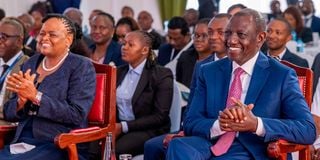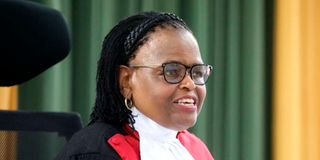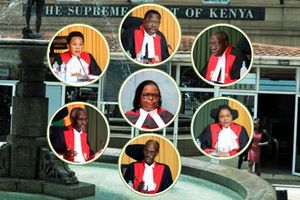
Supreme Court judges (from left) Isaac Lenaola, Dr Smokin Wanjala, Philomena Mwilu, Chief Justice Martha Koome, Mohamed Ibrahim, Njoki Ndung'u and William Ouko.
The High Court’s decision to halt Judicial Service Commission (JSC) proceedings seeking the ouster of the seven Supreme Court judges including Chief Justice Martha Koome underlines the magnitude of the battle facing the top judges.
While the judiciary has had tense relations with President William Ruto’s government - at one point the Head of State launched a series of public attacks on judges he accused of sabotaging his administration’s policies - the onslaught has recently grown bolder from some senior lawyers leading to the ouster petitions against them.
Significantly, the intervention by the High Court came as the JSC proceedings against the judges were entering a critical stage following which a decision was expected either clearing them or triggering their suspension pending the outcome of a tribunal appointed by the president to investigation claims of misconduct against them.

Chief Justice Martha Koome and President William Ruto during the commemoration of the 12 years since the establishment of the Supreme Court, at the Supreme Court Building in Nairobi County on November 4, 2024.
As provided in Article 168(4) of the Constitution, the commission had already considered the three petitions for the removal of the judges and had asked them to respond to the allegations facing them.
The petitioners want the entire seven-judge bench comprising CJ Koome, Deputy Chief Justice Philomena Mwilu, Justices Smokin Wanjala, Mohammed Ibrahim, Njoki Ndung’u, Isaac Lenaola and William Ouko axed over alleged incompetence and misconduct in handling various cases.
By halting the JSC proceedings, the High Court has short-circuited the system, albeit until a final decision of the case, which temporarily slows down a process that could occasion a constitutional crisis in the event the petitioners have their way.
Should the members of the JSC have been satisfied that the petitions disclose a ground for removal from office, the petitions would have been sent to the President for formation of a tribunal to investigate the judges.
At that stage, according to Article 168(5), the President suspends the judge from office and appoints a tribunal to try the judge, a move that would have caused a stalemate in the Judiciary since there would have been no Supreme Court judges. Their positions cannot be filled when they are on suspension.
Another impasse would have been on how the provisions of Article 168(8), which provides that a judge who is aggrieved by a decision of the tribunal may appeal against the decision to the Supreme Court, would have come into play in a scenario where the entire bench of the Supreme Court is the aggrieved party.
Although the order stopping the JSC proceedings originated from a judicial review case lodged by Mr Pariken Ole Esho at the High Court in Narok, it is not lost on observers that the development signals a big fight for survival by the top judges.

Chief Justice Martha Koome.
The 11-member JSC, which is chaired by the Chief Justice, has two officials appointed by the president to represent the public- Isaac Ruto (vice chair) and Caroline Nzilani Ajuoga among the commissioners.
Attorney-General Dorcas Oduor and Charity Kisotu, a representative of the Public Service Commission) are also members.
Others are Evalyne Olwande (Kenya magistrates and judges association female representative), Justice Mohammed Ibrahim (Supreme Court judges’ representative), Justice Fatuma Sichale (Court of Appeal judges’ representative) and Justice Anthony Mrima (Kenya magistrates and judges association male representative).
Law Society of Kenya is represented in the commission by Jacquilne Ingutiah (female representative) and Omwanza Ombati (male representative).
The court order issued by Justice Charles Kariuki on Wednesday blocks implementation of the decision by the JSC requiring the seven-judge bench led by the Chief Justice to submit their responses to three ouster petitions or any other petition that may face them.
The three petitions were filed by former Cabinet Secretary Raphael Tuju's Dari Limited, former Law Society of Kenya (LSK) president Nelson Havi and lawyer Christopher Rosana.
Their common prayer was the removal of the Chief Justice and the other Supreme judges from office over alleged incompetence and misconduct.
For several months, the judiciary has faced onslaught from LSK, politicians and top lawyers led by former LSK president Ahmednassir Abdullahi, senior counsel, accusing unnamed top judges of corruption.
Last year politicians led by President William Ruto launched a series of attacks on the judiciary casting aspersions on the integrity and independence of the judges. The President was reacting to a series of rulings from the courts against his administration.
The JSC started processing the petitions last month and upon deliberation on the allegations raised, the Commission on January 24 resolved that the CJ and the other six Supreme judges be requested to submit their responses.
For their part, the judges had also started preparing for the battle to save their careers by appointing advocates to represent them.
The feud between the Supreme Court and lawyers escalated after the judges banned lawyer Ahmednasir from appearing before the Apex Court for allegedly bashing the court on his social media handle.
The ban also extended to other lawyers working at the Ahmednassir’s law firm – Ahmednasir Abdullahi Advocates LLP.
But the court order on Wednesday slammed brakes on the ongoing process, giving the judges a major reprieve and chance to fight back.
The orders will remain in force pending the hearing and determination of Mr Ole Esho's case that concerns the procedural impropriety and the judges’ right to fair administrative action.
According to the petitioner, the JSC lacks clear procedural rules consistent with constitutional principles for handling complaints against Judges, Magistrates and other judicial officers.
"JSC lack of procedure rules for handling such complaints enables the Commission to act arbitrarily in directing the judges to respond to the petitions which do not meet the requisite threshold. Worse still, it creates a window for persons such as Dari Limited to direct the JSC on the process to adopt," said Mr Ole Esho.
He added that in asking the Supreme Court judges to respond to the petitions, the JSC decision violated natural justice and fair administration action.
Justice Kariuki also granted the petitioner authority to apply for an order of prohibition to prevent the JSC from continuing, maintaining and sustaining any such charges against the top judges.
“The leave is to operate as stay to stop the implementation of the decision by the JSC requiring Justice Martha Koome (CJ), Philomena Mwilu (Deputy Chief Justice) and Justices Dr Smokin Wanjala, Mohammed Ibrahim, Njoki Ndung’u, Isaac Lenaola and William Ouko to submit responses in respect of the three petitions or any other Petition whatsoever either before it or at all,” said Justice Kariuki.
The order also requires JSC to stop any such further proceedings against the said Supreme Court judges pending the hearing and determination of Mr Ole Esho’s judicial review case.
“The leave also stops any such further proceedings against the said seven judges of the Supreme Court of Kenya pending the hearing and determination of the substantive Judicial Review proceedings to be filed following the grant of leave,” the court said.
The petitioner asked court to direct the JSC to desist from continuing, maintaining and sustaining any such charges or proceedings against Judges, Magistrates and other judicial officers until the said procedural rules are in place.
Justice Kariuki directed the petitioner to file his pleadings within 21 days and fixed the case for mention on March 12, 2025.










